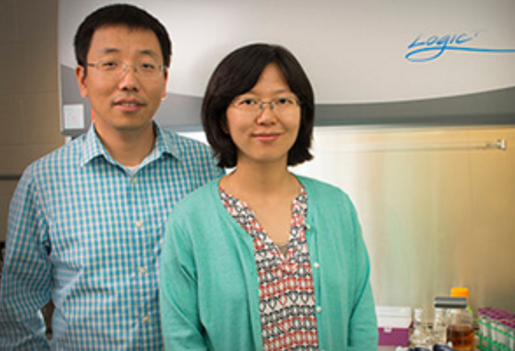

The quality of drinking water has been a hot news topic lately, such as the crisis in Flint, Mich. The quality and safety of drinking water is a critical issue due to source water pollution, ineffective water treatment and deteriorating plumbing. More than 20 percent of the water treatment systems in the United States are in violation of the Safe Drinking Water Act. What’s more is that those “systems do not include the more than 15 million U.S. households that rely on private wells for drinking water, where no municipal utility monitors the water quality." These private wells are the focus of a project being conducted in Granger, Ind., by Dong Wang, assistant professor of computer science and engineering, and Na Wei, assistant professor of civil & environmental engineering & earth sciences. They have been awarded a National Science Foundation (NSF) Early-concept Grant for Explorer (EAGER) Award for “Smart Water Sensing for Sustainable and Connected Communities Using Citizen Science.”
Water testing, especially when trying to rely on laboratory-based methods or one organization, is costly and takes time. Wang and Wei have proposed crowdsensing as a way to make the process more efficient, reliable, cost-effective, and timely — engaging the citizens of a community to participate in the monitoring and protection of their own water and health. By providing inexpensive off-the-shelf water quality test kits to residents, the citizens will be able to test for contaminant levels. Moreover, they will be able to do it in real-time. For the purposes of this project, the focus will be nitrate. This is due to the high level of nitrate in groundwater wells in some areas of the St. Joseph County.
Participating residents will report their test results, along with the location and time information, to the data analysis engine created by the project leaders. The engine will analyze the information and generate information that will be shared with the residents and county government to help them take actions to improve the water quality and reduce health risks.
This work will contribute to the fundamental challenges in using crowdsensing to affect healthier and more environmentally sustainable communities. Results, along with next steps, will be posted at the end of the study on the project website.
ABOUT EAGER
EAGER funding supports exploratory work in its early stages on untested, but potentially transformative, research ideas or approaches. All EAGER projects are considered especially “high risk-high payoff” in the sense that they involve radically different approaches, apply new expertise or engage novel disciplinary or interdisciplinary perspectives. The Notre Dame project combines the resources of two disciplines within of the College of Engineering to develop a citizen science based smart water sensing system that can accurately and efficiently detect drinking water contamination through crowdsensing, leveraging the citizens in a connected community to monitor, test, and report water quality issues.
ABOUT THE FACULTY

Wang, who is also a member of the Interdisciplinary Center for Network Science and Applications (iCenSA) at Notre Dame, came to the University in 2014, having most recently served as a postdoctoral research associate at the University of Illinois at Urbana Champaign. He authored a book “Social Sensing, Building Reliable Systems on Unreliable Data” in 2015. Wang’s research interests focus on big data analytics, cyber-physical systems, social sensing, smart cities, and Internet of things.

Wei joined the University in 2015 from her previous position of assistant professor of civil and environmental engineering at the University of Pittsburgh. The overarching theme of her research is to understand and manipulate microbial processes at the molecular level for beneficial biotransformation, specifically at the intersection of environmental engineering and synthetic and systems biology with an emphasis on providing novel solutions to challenges in the sustainability of water, energy, and public health.
Originally published by Nina Welding at conductorshare.nd.edu on September 27, 2016.